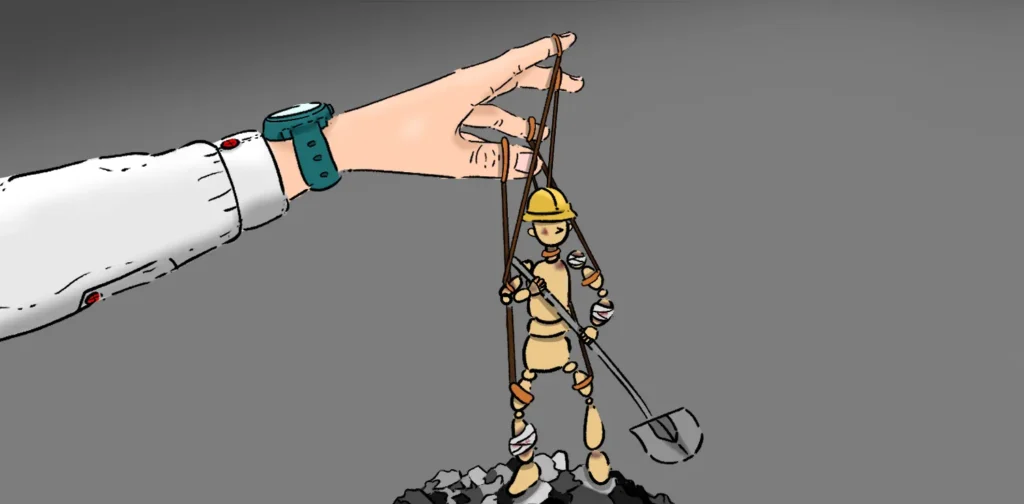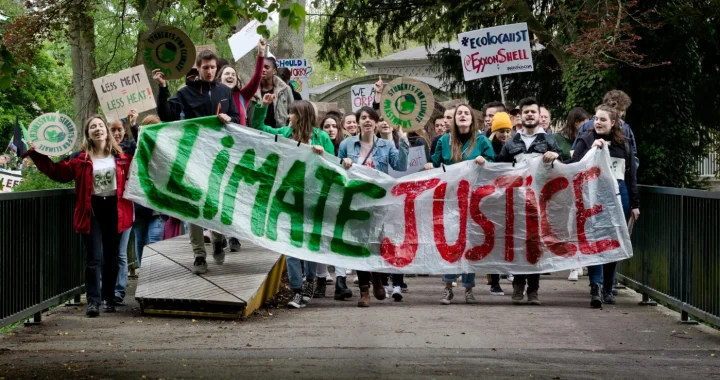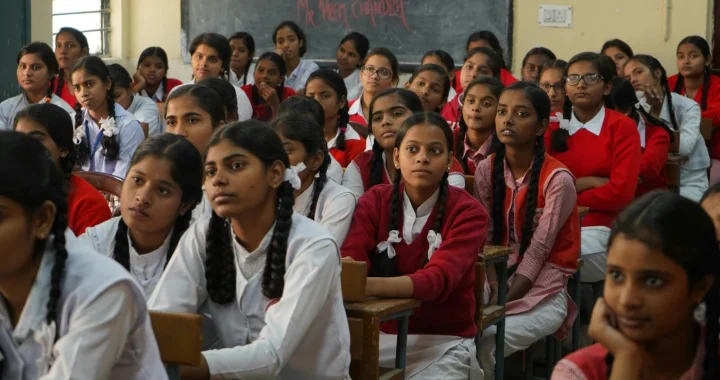Green Energy, Red Flags: Labor Exploitation and Deadly Accidents at Indonesia’s Nickel Capital

Illustration by Irhan Prabasukma
As the owner of the largest nickel reserves in the world, Indonesia plays a strategic role in the global energy transition, especially in supplying nickel as a key component for electric vehicle (EV) batteries. However, Indonesia’s ambition to become a leader in the critical mineral supply chain is riddled with workers’ rights violations. Rampant labor exploitation and workplace accidents paint the green transition red.
Recurring Workplace Accidents
Located in Central Sulawesi, Indonesia Morowali Industrial Park (IMIP) is the largest nickel-based industrial park in Indonesia, housing over 50 tenant companies. These companies are involved in operations related to processing facilities, such as nickel plants, steel plants, ferrochrome plants, ferrosilicon plants, and coke plants. Currently, over 80,000 employees work in the IMIP area.
Concerningly, IMIP has been seeing numerous deadly workplace accidents on site since its operation began in 2015. Until 2022, there were 18 workplace accidents, resulting in 15 fatalities and 41 injuries. Then, in 2023, 10 incidents killed 36 workers and injured 47 laborers. This included an explosion in the smelter furnace of a stainless steel company in the IMIP industrial park that killed 21 people. The number went up the next year, with 18 workplace accidents in that 2024 alone.
The accidents vary, ranging from heavy objects falling on workers to explosions and landslides involving hazardous waste. Despite this grim reality, there has been no significant improvement in governance to address these issues. A series of fatal workplace accidents within the Morowali industrial complex continue to occur in 2025.
Labor Exploitation and Other Workers’ Rights Violations
In addition to workplace accidents, workers at the IMIP also face various other issues that indicate a lack of proper governance that meet international standards. One of the most glaring issues is about workers’ health. IMIP workers face health risks from exposure to hazardous chemicals such as nickel, coal, sulfur, and asbestos. However, despite operating for 10 years, IMIP has not recorded any cases of Occupational Diseases—which is unlikely.
Another important issue is about the long working hours that exceed the safe limits recommended by the ILO and WHO. To earn a decent wage, IMIP workers must take on many shifts and overtime. Some common work patterns include: 12-hour days, 2 shifts, three teams totaling 60 hours per week; 8-hour days, 3 shifts, three teams totaling 52 hours per week; and 8-hour non-shift days totaling 48 hours per week. These long working hours contribute to chronic fatigue, stress, and increased risk of workplace accidents.
Unsurprisingly, labor exploitation goes hand in hand with inadequate wages. Workers on regular schedules receive only overtime pay from mandatory overtime, which is one extra hour per day. So, they may earn a monthly income of around 3.8 million to 7 million IDR (about 230 to 420 USD). Despite this, workers still complain about low wages due to the high cost of living in Morowali, including the cost of basic goods, housing rent, and fuel for motorcycles, as most workers use motorcycles to commute.
Female and Migrant Workers
Furthermore, IMIP’s 6,481 female workers are at unmitigated risk of gender-based violence. This issue arises due to a lack of facilities like separate buses and waiting areas that prioritize women’s safety and comfort at work. There is also a lack of other preventive measures, such as anti-harassment campaigns in the workplace. Female workers also face difficulties accessing menstrual leave and are required to work night shifts alongside men.
Moreover, worker issues at IMIP also involve migrant workers. A report by China Labor Watch revealed that Chinese workers often experience non-transparent wage cuts, forced labor, and dangerous working conditions that threaten their safety. Some companies involved in nickel processing are financially unstable, leading to delayed wage payments and poor living conditions in worker dormitories. This indicates that the labor exploitation is systemic, regardless of the workers’ origins.
Workers’ Protests Against Labor Exploitation
These issues, especially regarding labor exploitation and workplace accidents, highlight the lack of proper governance according to international standards, particularly regarding worker safety, health, and respect for workers’ rights.
There have been attempts to communicate the need for change to the IMIP management through various channels, including demonstrations. In early March 2025, riots and looting occurred at IMIP due to the company’s transportation policies that burdened workers. The riots caused significant material losses to IMIP, with several industrial facilities damaged, company vehicles burned, and assets looted, while production activities were temporarily halted.
Will this incident serve as a moment for the government, companies, and workers to collectively reform nickel governance to ensure fairness and improve the well-being of all parties involved?
Towards Just Governance in the Critical Minerals Industry
The Indonesian government needs to balance its ambition for nickel downstreaming with policies that ensure social justice, environmental protection, and workers’ rights. The government must tighten regulations and oversight of the nickel industry, ensuring that the economic benefits from nickel mining and processing are distributed equitably.
At the same time, companies in the IMIP area must improve worker welfare by creating safe and healthy working conditions, aiming for zero accidents. They must prioritize workers’ rights, including the distribution of equitable living wages for local and foreign workers as well as the protection of female workers.
Furthermore, companies must establish grievance mechanisms in their operations. This needs to be implemented immediately due to the high frequency of workplace accidents, violations of workers’ rights, and other social and environmental impacts. This system would allow workers to effectively voice concerns without fear of retaliation. Transparency and accountability in operations and grievance mechanisms are crucial, as this will allow the public, workers, and other stakeholders to monitor and evaluate the impacts and how they are being addressed.
Without concrete steps to improve the critical mineral industry governance, Indonesia risks creating an energy transition paradox, where the production of minerals for green technology results in social suffering and labor exploitation. It is time to ensure that energy transition is not only clean in technology but also fair to workers and surrounding communities.
Editor: Nazalea Kusuma

Co-create positive impact for people and the planet.
Amidst today’s increasingly complex global challenges, equipping yourself, team, and communities with interdisciplinary and cross-sectoral insights on sustainability-related issues and sustainable development is no longer optional — it is a strategic necessity to stay ahead and stay relevant.
Lubendik
Lubendik is currently a lecturer in the Department of International Relations at The Christian University of Indonesia. He is also a researcher in energy and environmental policy at Action for Ecology and People’s Emancipation (AEER), a research advocacy NGO based in Jakarta, Indonesia.


 From Anxiety to Action: How Youth Climate Activism Is Evolving
From Anxiety to Action: How Youth Climate Activism Is Evolving  India’s Supreme Court Declared Menstrual Health and Hygiene as Fundamental Rights
India’s Supreme Court Declared Menstrual Health and Hygiene as Fundamental Rights  Impacts of E-waste Pollution on Animals and Human Health
Impacts of E-waste Pollution on Animals and Human Health  Africa’s Solar Energy Surge: Why 2025 Was a Breakthrough Year
Africa’s Solar Energy Surge: Why 2025 Was a Breakthrough Year  Agrihoods: Integrating Farms and Urban Neighborhoods into Sustainable Communities
Agrihoods: Integrating Farms and Urban Neighborhoods into Sustainable Communities  Women in Waste Management: Asia’s Circularity Runs on Women. Its Policies Still Don’t
Women in Waste Management: Asia’s Circularity Runs on Women. Its Policies Still Don’t